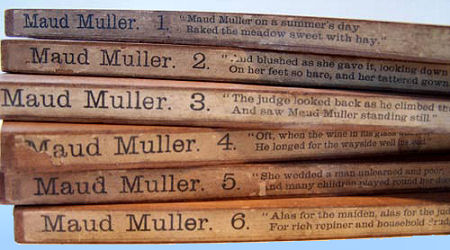 |
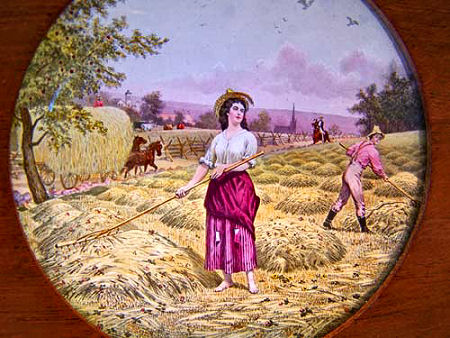 Maud Muller, on a summer's day, Raked the meadow sweet with hay.
|
Maud Muller, on a summer's day, Raked the meadow sweet with hay. Beneath her torn hat glowed the wealth Of simple beauty and rustic health. Singing, she wrought, and her merry glee The mock-bird echoed from his tree. But when she glanced to the far-off town, White from its hill-slope looking down, The sweet song died, and a vague unrest And a nameless longing filled her breast, A wish, that she hardly dared to own, For something better than she had known. |
|
| The Judge rode slowly down the lane, Smoothing his horse's chestnut mane. He drew his bridle in the shade Of the apple-trees, to greet the maid, And ask a draught from the spring that flowed Through the meadow across the road. She stooped where the cool spring bubbled up, And filled for him her small tin cup, And blushed as she gave it, looking down On her feet so bare, and her tattered gown. "Thanks!" said the Judge; "a sweeter draught From a fairer hand was never quaffed." He spoke of the grass and flowers and trees, Of the singing birds and the humming bees; Then talked of the haying, and wondered whether The cloud in the west would bring foul weather. And Maud forgot her brier-torn gown, And her graceful ankles bare and brown; And listened, while a pleased surprise Looked from her long-lashed hazel eyes. At last, like one who for delay Seeks a vain excuse, he rode away. Maud Muller looked and sighed: "Ah me! That I the Judge's bride might be! "He would dress me up in silks so fine, And praise and toast me at his wine. "My father should wear a broadcloth coat; My brother should sail a painted boat. "I'd dress my mother so grand and gay, And the baby should have a new toy each day. "And I'd feed the hungry and clothe the poor And all should bless me who left our door." |
(Dan komt er een jonge rechter voorbij, op zijn bruine paard. Dat is dan weer eens iets anders als de Prins op het witte paard, maar veel maakt dat niet uit. Wanneer hij het mooie meisje onder de appelboom ontwaart stuurt hij zijn paard direct de berm in.) 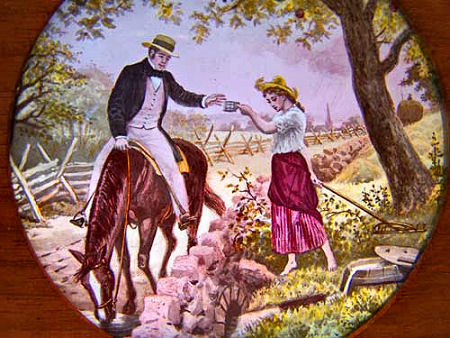 And blushed as she gave it, looking down On her feet so bare, and her tattered gown. (De rechter vraagt het meisje om een slokje water uit de bron naast de weg (kennelijk is hij zelf te beroerd om even af te stappen). Maud overhandigt hem blozend een kom met water, want ze schaamt zich voor haar blote voeten en haar gehavende kleren, en ze raken in een geanimeerd gesprek over zingende vogels en zoemende bijen. Wanneer de rechter is doorgereden verzucht Maud: ' O gottegot. Was ik maar met die man getrouwd. Dan zou ik altijd de mooiste kleren dragen en mijn familie zou trots op me zijn. Een nogal zelfzuchtige en materialistische invalshoek dus, maar gelukkig voegt ze er nog wel aan toe: 'Ik zou voor hen allemaal mooie kleding kopen. En speelgoed voor de kinderen. En voedsel voor de hongerigen'. Dat is dan toch wel weer aardig van haar.) |
| The Judge looked back as he climbed the hill, And saw Maud Muller standing still. "A form more fair, a face more sweet Ne'er hath it been my lot to meet. "And her modest answer and graceful air Show her wise and good as she is fair. "Would she were mine, and I to-day, Like her, a harvester of hay "No doubtful balance of rights and wrongs, Nor weary lawyers with endless tongues, "But low of cattle and song of birds, And health and quiet and loving words." But he thought of his sisters, proud and cold, And his mother, vain of her rank and gold. So, closing his heart, the Judge rode on, And Maud was left in the field alone. But the lawyers smiled that afternoon, When he hummed in court an old love-tune; And the young girl mused beside the well, Till the rain on the unraked clover fell. He wedded a wife of richest dower, Who lived for fashion, as he for power. Yet oft, in his marble hearth's bright glow, He watched a picture come and go; And sweet Maud Muller's hazel eyes Looked out in their innocent surprise. |
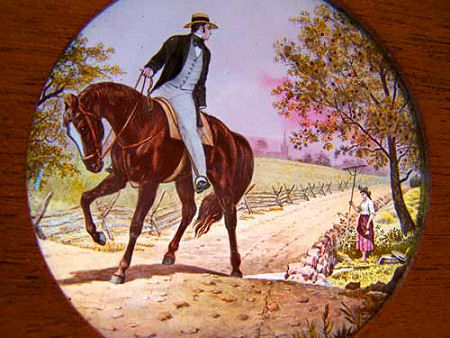
|
| Oft, when the wine in his glass was red, He longed for the wayside well instead; And closed his eyes on his garnished rooms To dream of meadows and clover-blooms. And the proud man sighed, with a secret pain, "Ah, that I were free again! "Free as when I rode that day, Where the barefoot maiden raked her hay." (Vaak denkt hij bij een glaasje rode wijn: 'Och, had ik mijn vrijheid maar terug.' (Geen ongewone gedachte voor een gehuwde man.) 'Zo vrij als toen ik dat ritje op mijn paard maakte en dat mooie meisje met die blote voeten ontmoette..... Kon ik maar weer het water uit die bron langs de kant van de weg drinken in plaats van deze Chateau le Pin 2004 (prijs 437,25 euro per liter.) Dat zou mij heel wat beter smaken dan deze troep.') (Wat de rechter natuurlijk niet wist was dat zijn bediende de fles kort daarvoor heimelijk verwisseld had met een slobberwijntje van de Lidl teneinde later op de avond zelf voor het slapen gaan nog even van het dure vocht te gaan genieten met zijn liefje.) |
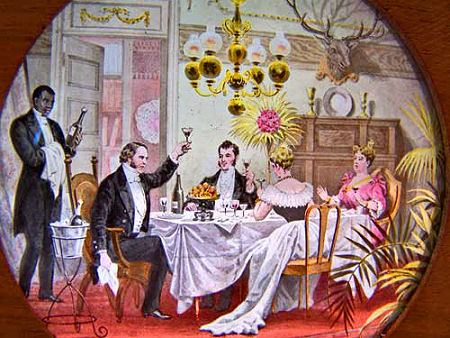 Oft, when the wine in his glass was red, He longed for the wayside well instead; |
| She wedded a man unlearned and poor, And many children played round her door. But care and sorrow, and childbirth pain, Left their traces on heart and brain. And oft, when the summer sun shone hot On the new-mown hay in the meadow lot, And she heard the little spring brook fall Over the roadside, through the wall; In the shade of the apple-tree again She saw a rider draw his rein. And gazing down with timid grace She felt his pleased eyes read her face. Sometimes her narrow kitchen walls Stretched away into stately halls; The weary wheel to a spinnet turned, The tallow candle an astral burned, And for him who sat by the chimney lug, Dozing and grumbling o'er pipe and mug, A manly form at her side she saw, And joy was duty and love was law. Then she took up her burden of life again, Saying only, "it might have been." |
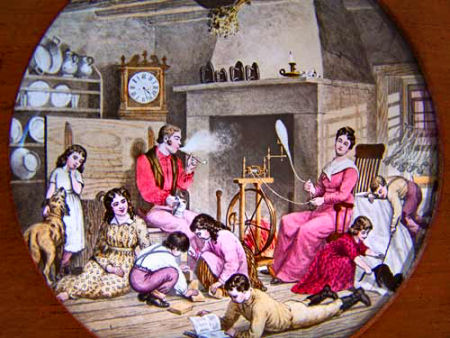 She wedded a man unlearned and poor, And many children played round her door. (Maud trouwde uiteindelijk dan maar een man die ongeletterd en arm was. Haar te kleine huisje werd al snel gevuld met een rijke kinderschaar. Maar vaak droomde zij weg en stelde zich voor dat ze in een huis met statige hallen woonde, waar een spinet in stond in plaats van een spinnewiel en waar de kaarsen altijd brandden. Dan keek ze naar die futloze, mopperige man tegenover haar met een pul bier in zijn ene hand en een pijpje in de andere. Actief werd hij alleen in bed. Vreugde was een plicht geworden en liefde was wet. Maar al snel herstelde zij zich, nam haar zware last weer op haar schouders en sprak slechts: 'Ach ja.... zo had het geweest kunnen zijn.') |
| Alas for maiden, alas for Judge, For rich repiner and household drudge! God pity them both! and pity us all, Who vainly the dreams of youth recall. For of all sad words of tongue or pen, The saddest are these: "It might have been!" Ah, well! for us all some sweet hope lies Deeply buried from human eyes; And, in the hereafter, angels may Roll the stone from its grave away! (Helaas voor het meisje en voor de rechter: als hadden komt is hebben te laat. Moge God medelijden met hen hebben en met ons allemaal. Misschien zorgen de engelen in het hiernamaals er nog voor dat alles uiteindelijk goed komt.) |
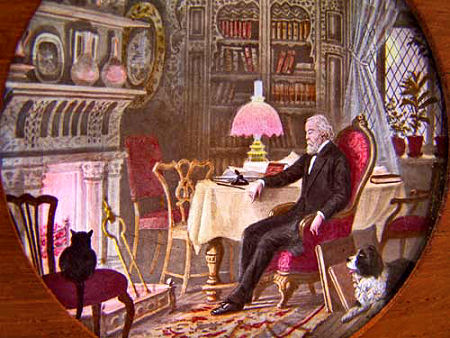
For of all sad words of tongue or pen, The saddest are these: "It might have been!" |
 John Greenleaf Whittier was een Amerikaanse dichter (1807-1892).
Hij werd geboren op een boerderij en kreeg in zijn jeugd slechts een beperkte
opleiding, maar hij ontwikkelde zichzelf door de dichtkunst. Hij kwam al
snel in de
journalistiek terecht en publiceerde zijn eerste gedichtenbundel in
1831. In 1856 schreef hij Maud Muller.
John Greenleaf Whittier was een Amerikaanse dichter (1807-1892).
Hij werd geboren op een boerderij en kreeg in zijn jeugd slechts een beperkte
opleiding, maar hij ontwikkelde zichzelf door de dichtkunst. Hij kwam al
snel in de
journalistiek terecht en publiceerde zijn eerste gedichtenbundel in
1831. In 1856 schreef hij Maud Muller.Merk op dat er een treffende gelijkenis is tussen de hier geportretteerde man en de oude rechter op de laatste lantaarnplaat. |
Van alle trieste woorden,
van de tong of de pen, zijn "Zo had het geweest kunnen zijn!" de ergste die ik ken. |
|
|
|
| |
©1997-2021 'de Luikerwaal' Alle rechten voorbehouden. Bijgewerkt tot 19-05-2021. |
|